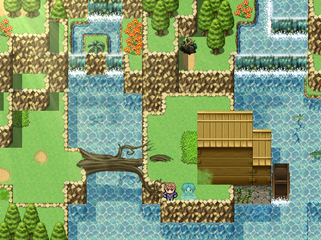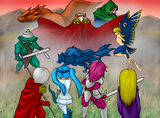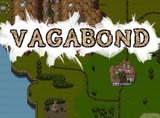RAMSHACKIN'S PROFILE
Search
 Unlocking Convenience
Unlocking Convenience
This is an area of game design that always has me torn.
The idea is a player can unlock, purchase, find, or acquire an upgrade that makes the game more convenient to play.
Some examples include: purchasing more storage space from a banker, finding an item that shows enemy health bars, upgrading your strength stat to increase inventory carrying capacity. I have a few of these in my current project too: an item that permanently increases movement speed, an item that controls whether it's day or night, and one that lets the player teleport from their home to common locations.
On one hand, if the game designer knows these features will make the game easier to play, shouldn't they be available from the start? Isn't it our job as developers to make games that are as convenient to play as possible? Aren't we harming the experience by purposefully locking these types of features?
But on the other hand, unlocking stuff feels awesome, man. These features work great as rewards since we immediately see the value after having been playing the game "the hard way". There's something satisfying about looking back and thinking, "ha, remember when I had to actually care about how many storage tabs I had?"
Where do you stand? Is it okay for a game designer to purposefully make their game less convenient in order to provide satisfying unlocks? Does the concept work better or worse in different situations?
The idea is a player can unlock, purchase, find, or acquire an upgrade that makes the game more convenient to play.
Some examples include: purchasing more storage space from a banker, finding an item that shows enemy health bars, upgrading your strength stat to increase inventory carrying capacity. I have a few of these in my current project too: an item that permanently increases movement speed, an item that controls whether it's day or night, and one that lets the player teleport from their home to common locations.
On one hand, if the game designer knows these features will make the game easier to play, shouldn't they be available from the start? Isn't it our job as developers to make games that are as convenient to play as possible? Aren't we harming the experience by purposefully locking these types of features?
But on the other hand, unlocking stuff feels awesome, man. These features work great as rewards since we immediately see the value after having been playing the game "the hard way". There's something satisfying about looking back and thinking, "ha, remember when I had to actually care about how many storage tabs I had?"
Where do you stand? Is it okay for a game designer to purposefully make their game less convenient in order to provide satisfying unlocks? Does the concept work better or worse in different situations?
 Writing gameplay mechanics into the narrative
Writing gameplay mechanics into the narrative
I have a dungeon where two party members get stuck and work together to get out. The puzzle mechanics involve the floor being split into black and white tiles. One character can only walk on the black tiles, while the white tiles act as walls, and reverse for the other character. The problem is there is no narrative reason for why they can't walk freely.
So how do you deal with gameplay mechanics that don't make sense from a story perspective?
One option is keeping them separate. The characters never mention or discuss the elaborate puzzles they are working their way through. Dialog is used for character building and advancing the plot, not for discussing why the party has to collect 4 planks to assemble a bridge over the river instead of swimming across.
The other option is to work the gameplay into the story. But I feel this is difficult to do without sounding like a cop-out. Oh hey, this is that one magic temple where your birth date determines what color tiles you can step on.
Maybe you just never have gameplay mechanics that don't fit the overall narrative?
So how do you deal with gameplay mechanics that don't make sense from a story perspective?
One option is keeping them separate. The characters never mention or discuss the elaborate puzzles they are working their way through. Dialog is used for character building and advancing the plot, not for discussing why the party has to collect 4 planks to assemble a bridge over the river instead of swimming across.
The other option is to work the gameplay into the story. But I feel this is difficult to do without sounding like a cop-out. Oh hey, this is that one magic temple where your birth date determines what color tiles you can step on.
Maybe you just never have gameplay mechanics that don't fit the overall narrative?
 Dealing with Poison
Dealing with Poison
As a developer, how do you handle your Poison condition? Or your Bleed/Burn/Disease/whatever other damage over time condi.
By default in VX Ace, it's -10% HP a turn. This isn't very useful against a standard enemy that dies in a few turns, but is incredibly useful against a boss. A pretty common tactic is to make bosses immune to poison, which makes the whole thing pretty worthless.
So how do you make a Poison skill that's worthwhile, yet balanced?
By default in VX Ace, it's -10% HP a turn. This isn't very useful against a standard enemy that dies in a few turns, but is incredibly useful against a boss. A pretty common tactic is to make bosses immune to poison, which makes the whole thing pretty worthless.
So how do you make a Poison skill that's worthwhile, yet balanced?
 Things I've Learned
Things I've Learned
I've been making games for over a decade. Now every few years, I go back and play my old games. This year, I decided to make a list of everything I've learned, good or bad, from my past games.
What concepts were so simple even 13 year old Ramshackin got it right? What mistakes kept being made despite repeatedly watching play testers run into them? Here's my list:
If there is a way to fully heal, player's will always rely on it, no matter how inconvenient
One game featured a coliseum where the party was fully healed after each battle. When a player needed a heal, they would leave where they were, walk to the coliseum, fight a battle, then walk back. This was fun for no one. But was too effective not to do.
If 4 characters can battle at a time, only 4 characters will be used
This comes in two flavors: large number of characters to recruit to the 4 man party, or large party of freely swappable characters, where only 4 can battle at a time. Having not finished a game of the second type, I'll use Edifice as my example. My party always consisted of the same characters. Craze must have known this when making the game, because there are battles that force you to use a random party.
This problem compounds when unused characters don't receive updated equipment or battle experience. I thought I could be clever by making side quests that required a certain character. It just meant I spent time on content that will never be played.
Defend/Guard option is never chosen
Some games make guard more enticing by offering a side benefit, like MP recovery. It ends up being the free MP heal command. Other games will force a battle with an enemy that charges, followed by a strong attack. The best battles aren't often inspired by the question, "How do I make this menu command useful?"
Don't wait until level 20 to introduce the interesting mechanics
This is the recurring theme of my games. The interesting skills, original mechanics, and character building come later in the game. I always have this need to ease players into the game by starting off with the generic RPG systems. Player's interest is gone by the time the game gets good.
Enemies should be more than bags of HP
Enemies never did anything interesting in my early games. No threat. Nothing to react to. The challenge was how fast you can kill them.
Repeatedly failing to apply a condition due to chance is frustrating
Especially when there is no indication that the boss was just straight up immune.
Players use money on combat; Aesthetics and minigames are second priority
I had a great idea. There would be a costume shop. Players could change the main character's graphic through buying all sorts of outfits. It would be awesome.
No one bought anything. All money went towards making the party better in combat. The only exception was towards the end of the game when the player was overflowing with money. And then, it wasn't to wear the outfits. It was for the completionist need to unlock everything.
Make sure the player knows where they can go
50 side quests aren't important when the player doesn't know where to go to start them. Maps are best when the exits are clear. I should have known my mapping was bad when I had to tell every player, "By the way, you can enter a different room by going here."
Don't underestimate giving the player mementos
This was one of my favorite parts of my earlier games. Each adventure would award you with a memento. A little item with no use outside of flavor text reminding you what you did to earn it. There is something satisfying about scrolling through the list near the end of the game.
Jumping can completely change the way players view the game world
A simple feature that opens up new opportunities for map design.
Enemy encounters are more enjoyable when there is a story behind them
Random encounters? Not too exciting. An enemy with personality and motive and a reason for the player to fight them? Much better.
One thing I just realized I liked about my earlier games: random encounters were unusual. Scripted encounters were the majority of battles.
The characters you interact with can really drive the game
Extending the previous to allies and NPCs. Sometimes friends want to play my old games. It's not because they loved the epic battle against the evil dragon. It's because they want to go back and once again meet the wacky characters we created when we were young.
Don't underestimate the driving force behind "who will I meet next?" and "I want to know more about him."
What concepts were so simple even 13 year old Ramshackin got it right? What mistakes kept being made despite repeatedly watching play testers run into them? Here's my list:
If there is a way to fully heal, player's will always rely on it, no matter how inconvenient
One game featured a coliseum where the party was fully healed after each battle. When a player needed a heal, they would leave where they were, walk to the coliseum, fight a battle, then walk back. This was fun for no one. But was too effective not to do.
If 4 characters can battle at a time, only 4 characters will be used
This comes in two flavors: large number of characters to recruit to the 4 man party, or large party of freely swappable characters, where only 4 can battle at a time. Having not finished a game of the second type, I'll use Edifice as my example. My party always consisted of the same characters. Craze must have known this when making the game, because there are battles that force you to use a random party.
This problem compounds when unused characters don't receive updated equipment or battle experience. I thought I could be clever by making side quests that required a certain character. It just meant I spent time on content that will never be played.
Defend/Guard option is never chosen
Some games make guard more enticing by offering a side benefit, like MP recovery. It ends up being the free MP heal command. Other games will force a battle with an enemy that charges, followed by a strong attack. The best battles aren't often inspired by the question, "How do I make this menu command useful?"
Don't wait until level 20 to introduce the interesting mechanics
This is the recurring theme of my games. The interesting skills, original mechanics, and character building come later in the game. I always have this need to ease players into the game by starting off with the generic RPG systems. Player's interest is gone by the time the game gets good.
Enemies should be more than bags of HP
Enemies never did anything interesting in my early games. No threat. Nothing to react to. The challenge was how fast you can kill them.
Repeatedly failing to apply a condition due to chance is frustrating
Especially when there is no indication that the boss was just straight up immune.
Players use money on combat; Aesthetics and minigames are second priority
I had a great idea. There would be a costume shop. Players could change the main character's graphic through buying all sorts of outfits. It would be awesome.
No one bought anything. All money went towards making the party better in combat. The only exception was towards the end of the game when the player was overflowing with money. And then, it wasn't to wear the outfits. It was for the completionist need to unlock everything.
Make sure the player knows where they can go
50 side quests aren't important when the player doesn't know where to go to start them. Maps are best when the exits are clear. I should have known my mapping was bad when I had to tell every player, "By the way, you can enter a different room by going here."
Don't underestimate giving the player mementos
This was one of my favorite parts of my earlier games. Each adventure would award you with a memento. A little item with no use outside of flavor text reminding you what you did to earn it. There is something satisfying about scrolling through the list near the end of the game.
Jumping can completely change the way players view the game world
A simple feature that opens up new opportunities for map design.
Enemy encounters are more enjoyable when there is a story behind them
Random encounters? Not too exciting. An enemy with personality and motive and a reason for the player to fight them? Much better.
One thing I just realized I liked about my earlier games: random encounters were unusual. Scripted encounters were the majority of battles.
The characters you interact with can really drive the game
Extending the previous to allies and NPCs. Sometimes friends want to play my old games. It's not because they loved the epic battle against the evil dragon. It's because they want to go back and once again meet the wacky characters we created when we were young.
Don't underestimate the driving force behind "who will I meet next?" and "I want to know more about him."
 Dego - Multiplayer Dungeon Crawler
Dego - Multiplayer Dungeon Crawler
~Screenshots~
(What everyone wants to see first)


~Beta Download~
Download Beta!
~More Info, Screens, and Gameplay Video~
http://www.rpgmaker.net/games/1021/
(What everyone wants to see first)


~Beta Download~
Download Beta!
~More Info, Screens, and Gameplay Video~
http://www.rpgmaker.net/games/1021/
~Storyline~
You play the ignorant, silent hero sent to save the people by slaying the mysterious, evil lord. ???
~Characters~
You - The main hero of this tale. Design your custom character, choose your class, and set out on an adventure! Your appearance can be changed at any time, provided you've found or bought the clothes.
Your friends - Have up to 3 optional party members join your adventure! Mix and match classes and weapon types to come up with the funnest way to lay waste to any foe that crosses your path!
~Combat~
Because of the multiplayer nature, I wanted the game to focus more on player skill than their time spent collecting experience. While upgrading your stats does make you awesome, personal experience plays a bigger role than statistical experience.
~Beta Featues~
-22 items
-3 monsters
-1 short testing dungeon
-90% working menu
~Ok, how do I play?~
A button attacks
B button uses your special attack, determined by weapon
Double tap a direction to do a dodge/dash
Hold A+B for a second to use your class determined skills
Beneath your hp their is a yellow bar, when it is 1/4 of the way full, you can use your level 1 skill. When it is 2/4, you can use your level 2 skills, etc.
Dungeon ends with 3 chests for each character. Press Escape to return to menu
Arrows keys, Z, X are default controls btw
There you have it! Help me balance this game out before I jump into making real content. What class did you play? What skills were cool? What weapons rocked?
Pages:
1



















